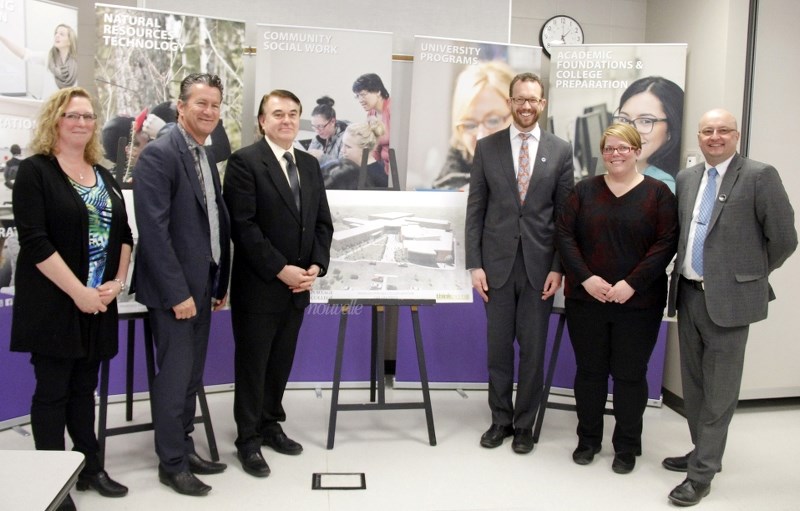The local Portage College campus is receiving a much-needed financial boost as they begin to map out the future of their Cold Lake facility.
On Monday, May 1, the Government of Alberta announced their contribution of $1.1 million in funding towards the initial stages of expanding the Cold Lake Portage College campus.
The money will be used to identify opportunities for additional space for students, as well as increase programming offered by the college. This could see the addition of courses such as pharmacy technologist, trades, and continuing education.
Prior to announcing the funding, Alberta Minister for Advanced Education Marlin Schmidt saw first hand the lack of space available for students as he toured the college last week.
“The space is very much needed,” he described. “We would like to see more space for students so that they can have better learning opportunities to further their careers and make their lives better here in Cold Lake.”
In January, City of Cold Lake and Portage College representatives made a presentation to Schmidt about acquiring the necessary dollars to get the expansion project off the ground. They emphasized the lack of space, and how students are currently meeting in stairwells for study groups and socializing.
“The funding is critically important for the college for future prospects in Cold Lake. The college simply doesn't have $1.1 million to put into a very specific project. This money comes at a time when we can plan in consultation with the city as they are looking at the existing and future footprint of this site,” said Portage College president Trent Keough.
Working with city officials, Portage will continue to brainstorm ideas while studying the most desirable programs. This will be done by undertaking a review of all of the programs available. So far, they have added the pharmacy technologist program to their comprehensive institution plan.
Portage College executive vice president academic Nancy Broadbent expressed that as a small community college, their collaboration with the City of Cold Lake has had a big impact on their continued growth.
“Being able to serve people in their home community will require the community to surround them with support,” Broadbent emphasized.
Keough added, “We never feel lonely in this city. We feel like a part of it.”
City of Cold Lake Mayor Craig Copeland said the community stands behind the college, and continuing to make Cold Lake a better place to live while providing advanced education opportunities to its residents.
“It's all about building a puzzle, it takes a long time to build a puzzle, but everything is coming together really nicely.”
Working on the project with the city is Tracy Boyde, vice president of infrastructure and IT at Portage College.
The expansion is in its early stages, he explained, adding there is still a long way to go before they will see a final draft of the design.
During their initial presentation to the minister, they presented a basic preliminary drawing. Earlier discussions with students determined the school's need for more common areas where they can study, meet and socialize.
“Our earliest discussions with students and staff determined that we needed a larger footprint that would blend into the existing architecture,” explained Boyde, adding currently there is almost double the number of students attending Portage College than the school was originally built for.
Portage will be working closely with the city's hired architects and engineers as they continue to create conceptualized drawings, and conduct studies to determine what the area would like to see included in college programming.
“It all depends on what the final mix of programs will be in terms of what the footprint will need to be as we move forward,” he concluded.
Roy Ripkens, acting board chair for Portage College said, “We also recognize that in order for Alberta students to have an edge in this highly competitive economy, post-secondary education has become much more of a necessity. The demand for specialized skills and training has never been higher, and regional colleges are a critical part of maintaining this competitive advantage.”



